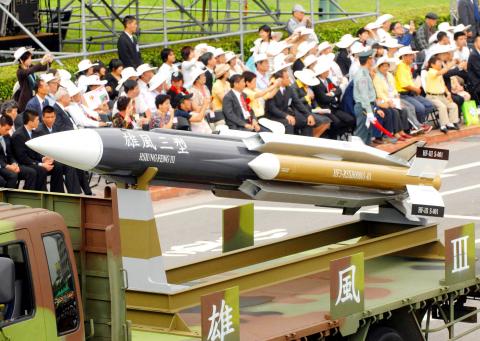The Taiwanese anti-ship missile that was accidentally launched last week, hitting a Taiwanese fishing boat and killing its captain, is a powerful weapon in which foreign nations have expressed interest since the Paris Air Show last year, a source in the Ministry of National Defense told reporters.
The source said the Hsiung Feng III is the mainstay of the Taiwanese military’s ship-killing arsenal, and one of the few supersonic anti-ship missiles in the world to be independently designed and produced, making it a desirable item in the global arms market.
However, the ministry does not foresee the possibility of selling the Hsiung Feng III to other nations, as the missile has just entered mass production and is a restricted weapon whose export is constrained by factors outside of the ministry’s control, the source said.

Photo: AFP
Researched and developed by the Chungshan Institute of Science and Technology, the Hsiung Feng III has a maximum effective range of between 130km and 150km, while a new extended-range model has a range of more than 300km.
When the institute became a legal entity under the control of the Executive Yuan, it was directed to showcase Taiwan’s defense technology to the international community, and has since then actively participated in international aeronautic exhibitions, the source said.
Several potential buyers made inquiries through intermediaries about the weapon’s technical specifications following the deadly mishap, the source said.
Because it is an aircraft-carrier-killing weapon, the nation’s allies have repeatedly expressed interest in it during joint military events, the source said.
Even at the research and development stage of the missile, representatives from foreign government agencies and arms makers contacted the government and the institute about Taipei’s willingness to sell the weapon or technology related to it, the source said.
The Taiwanese military’s purchase program for the Hsiung Feng III ran from 2007 to last year, and had a total budget of NT$11.89 billion (US$368.3 million), including deployment costs.
The commonly cited price of NT$100 million for 120 missiles is a misconception, the source said, because it fails to take into account the added cost of refurbishing facilities and one-year’s supply of spare parts.

Taiwan is projected to lose a working-age population of about 6.67 million people in two waves of retirement in the coming years, as the nation confronts accelerating demographic decline and a shortage of younger workers to take their place, the Ministry of the Interior said. Taiwan experienced its largest baby boom between 1958 and 1966, when the population grew by 3.78 million, followed by a second surge of 2.89 million between 1976 and 1982, ministry data showed. In 2023, the first of those baby boom generations — those born in the late 1950s and early 1960s — began to enter retirement, triggering

One of two tropical depressions that formed off Taiwan yesterday morning could turn into a moderate typhoon by the weekend, the Central Weather Administration (CWA) said yesterday. Tropical Depression No. 21 formed at 8am about 1,850km off the southeast coast, CWA forecaster Lee Meng-hsuan (李孟軒) said. The weather system is expected to move northwest as it builds momentum, possibly intensifying this weekend into a typhoon, which would be called Mitag, Lee said. The radius of the storm is expected to reach almost 200km, she said. It is forecast to approach the southeast of Taiwan on Monday next week and pass through the Bashi Channel

NO CHANGE: The TRA makes clear that the US does not consider the status of Taiwan to have been determined by WWII-era documents, a former AIT deputy director said The American Institute in Taiwan’s (AIT) comments that World War-II era documents do not determine Taiwan’s political status accurately conveyed the US’ stance, the US Department of State said. An AIT spokesperson on Saturday said that a Chinese official mischaracterized World War II-era documents as stating that Taiwan was ceded to the China. The remarks from the US’ de facto embassy in Taiwan drew criticism from the Ma Ying-jeou Foundation, whose director said the comments put Taiwan in danger. The Chinese-language United Daily News yesterday reported that a US State Department spokesperson confirmed the AIT’s position. They added that the US would continue to

The number of Chinese spouses applying for dependent residency as well as long-term residency in Taiwan has decreased, the Mainland Affairs Council said yesterday, adding that the reduction of Chinese spouses staying or living in Taiwan is only one facet reflecting the general decrease in the number of people willing to get married in Taiwan. The number of Chinese spouses applying for dependent residency last year was 7,123, down by 2,931, or 29.15 percent, from the previous year. The same census showed that the number of Chinese spouses applying for long-term residency and receiving approval last year stood at 2,973, down 1,520,